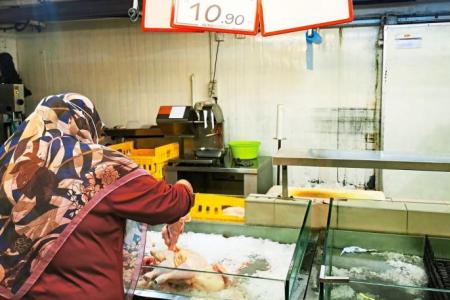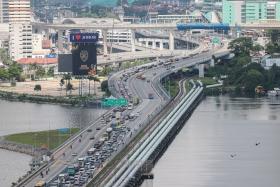Malaysia to stop exporting 3.6 million chickens from June 1 for a month
KUALA LUMPUR - Malaysia will stop the export of 3.6 million whole chickens a month until production and prices stabilise, Prime Minister Ismail Sabri Yaakob said on Monday (May 23).
This will start on June 1.
More overseas abattoirs will also be recognised to boost the country’s chicken supply, and import permits for poultry will be scrapped.
“The government views seriously the issue of the chicken supply and rising prices that are affecting the people,” Datuk Seri Ismail said in a statement.
The moves come as the country faces a shortage of chickens along with soaring prices.
Malaysia exported more than 49 million live chickens in 2020, as well as 42.3 tonnes of chicken and duck meat, according to the Ministry of Agriculture and Food Industries' Department of Veterinary Services data.
Singapore imported almost 73,000 tonnes of chicken in 2021 - more than a third of its chicken supply - from Malaysia. Chicken is the most widely consumed meat in Singapore, with a per capita consumption of 36kg in 2020, according to data from the Singapore Food Agency.
Mr Ismail said buffer stocks will also be kept in cold storage facilities while the process to claim subsidies by breeders will be simplified.
The government is aware of reports that cartels were controlling the prices and production of chicken, he said.
The Malaysia Competition Commission (MyCC) is investigating the matter and the probe is expected to be completed by June.
The government has fixed a retail ceiling price of RM8.90 (S$2.80) per kilogram, and is giving poultry farmers a subsidy of 60 sen per kg from Feb 5 to June 4.
However, only RM50 million of subsidies of the RM729.43 million due have been paid out to breeders so far.
Mr Ismail said: “Several large companies are not interested in applying for the subsidies and want the government to allow the price of chicken to be determined by the market.”
The weekly Cabinet meeting, which usually takes place on Wednesday, was pushed forward to Monday in order to discuss the poultry shortage that has caused chicken prices to soar.
Wholesale prices have reportedly soared to around RM13 per kg at markets in the Klang Valley, while some stalls were said to have closed due to a lack of supply.
According to reports, poultry farmers have halted output due to a delay in government subsidy payouts.
The Federation of Livestock Farmers’ Associations of Malaysia (FLFAM) has denied that breeders were deliberately holding back the supply of chickens.
A livestock farm in Melaka was said to have issued a notice that supplies would cease on May 21 and 22 because chickens were not gaining weight.
Poultry farmers have warned the government that sustained low ceiling prices for chicken and eggs would hurt the industry in the long run.
They said they are struggling amid the skyrocketing cost of feed due to the ongoing war between Ukraine and Russia, which has throttled grain supplies from both countries.
Russia is also a major producer of fertiliser that is needed to grow the grain.
Meanwhile, a targeted oil subsidy for Malaysia’s lower-income group is being considered as rising crude oil prices push the subsidy bill higher.
International Trade and Industry Minister Azmin Ali said this was necessary after an increase in the fuel subsidy projection for 2022 to RM28 billion, from RM11 billion last year.
Get The New Paper on your phone with the free TNP app. Download from the Apple App Store or Google Play Store now


